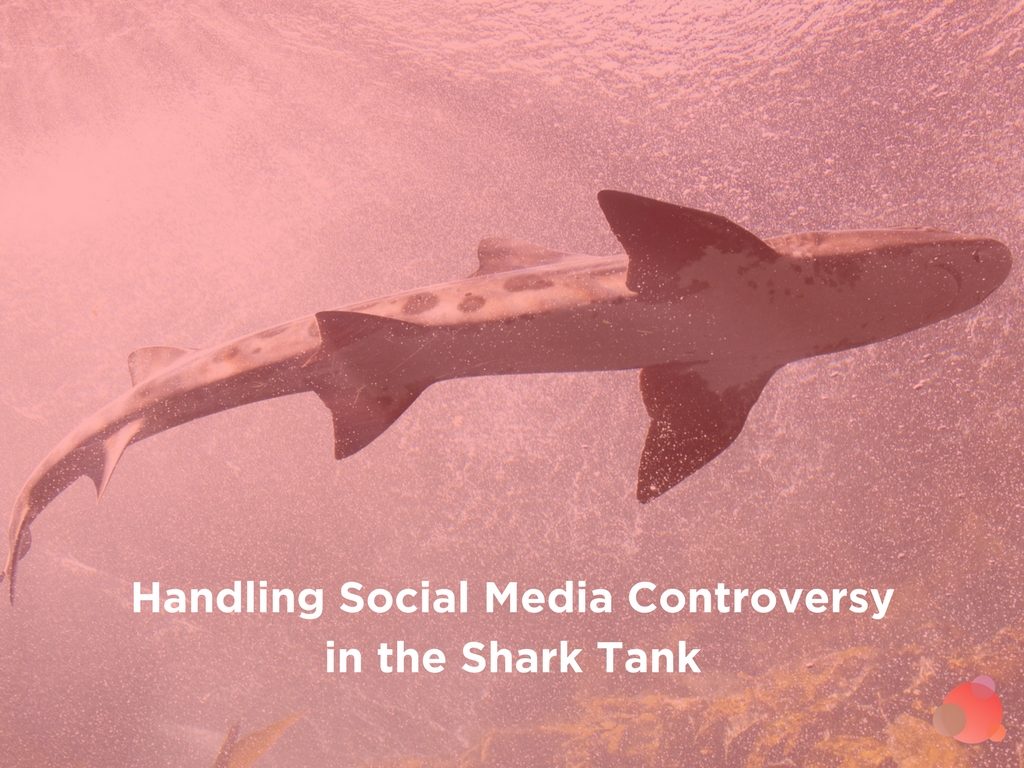I’m going to present the standard stance on social media controversy–and then I’m going to tell you why it’s wrong.
Before I start, a quick aside: if you’re on social media, controversy is everywhere.
The biggest social network in the world is an icon of controversy.
You know who I’m talking about.
If you want to steer clear of social media controversy, it would seem logical to get off of Facebook. That’s why #DeleteFacebook is a thing.
Some big names are not interested in being associated with the network.
As of this writing, Facebook dissenters include Elon Musk, Steve Wozniak, and WhatsApp co-founder Brian Acton.
Pep Boys, Mozilla, and Sonos are pausing their Facebook campaigns until the smoke clears.
If I’m interpreting standard advice correctly, pausing your presence on Facebook would seem like the right thing to do.
To engage with social media like a “rockstar,” you should “avoid weighing in on controversial and polarizing topics.”
If a controversial topic rears its ugly head, “don’t get involved.”
You should be able to “take advantage of trending topics while staying neutral,” whatever that means.
And whatever you do, “don’t feed the trolls.”
Yes, I don’t think feeding the trolls is a good idea—they’ll troll you.
But even though the other “social media rockstar” tips are right on —be active, pay attention to how much people are engaging with your posts—the idea of not weighing in on controversial topics is fundamentally incorrect.
Values Are Part of Branding
A lot of consumers want your company or band to take a stand.
Simply put, it tells them what your brand stands for.
An estimated 66 percent of consumers want brands to take a “strong stand” on issues.
About 58 percent of consumers are perfectly happy when your brand takes social media controversy head-on.
But, they’re not quite as enthusiastic about your brand taking a stand on other channels.
Around 47 percent of consumers are looking for your brand’s candor on TV or radio, while 38 percent want your brand’s take on the company website or blog.
This makes sense because hanging out on social media is kind of like being at a bar. Social media is where people let loose.
On other channels, such as television, it’s all about the product, and there’s a script, a facade.
Social media should showcase the authentic, unscripted, human aspect of a brand.
There’s this thing called brand identity prism. The personality, relationship, and culture parts of the prism have a lot to do with what I’m talking about.
When Brands Use Social Media Controversy for Good
A brand is like a person.
A person with a personality will take a stand on issues they care about, even if there’s controversy involved.
If they don’t take a stand, people wonder if they have a spine.
Functional people cultivate relationships.
Having a conversation with your audience about a controversial issue is a great way to strengthen relationships.
Culture has a lot to do with values. People with similar values create cultures.
If your brand values sustainability, for example, you’re part of a culture that puts a premium on protecting the environment. If the EPA doesn’t do its job, that’s controversial, and you’re perfectly positioned to comment on it.
You’re not going to comment on controversial issues willy-nilly—you are representing a business after all.
But if you’re representing a small business that has a stake in an issue, you have absolutely nothing to lose by raising your voice.
Now, are you ready to see the best practices for handling controversial topics? Then let’s do this.
Lyft Seizes an Opportunity
Rideshare company Lyft did this well in January 2017 when Trump instituted his travel ban.
Lyft definitely didn’t have anything to lose in its competition against Uber.
While Uber kept running during a taxi strike to protest the ban—EConsultancy reports that Uber met with derision for doing so—Lyft seized the opportunity to take a stand against the travel ban in a big way.
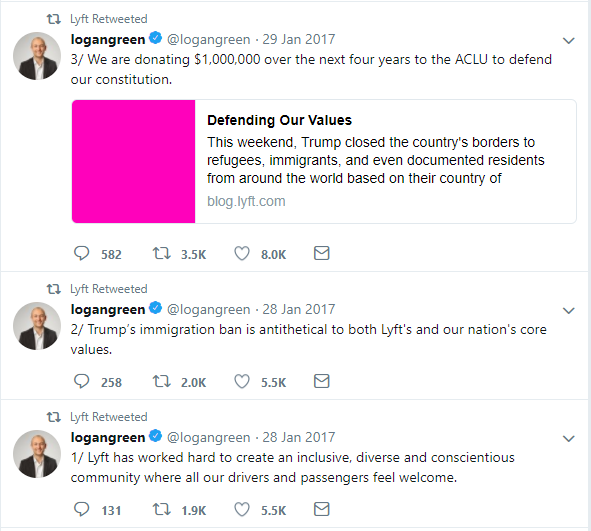
Logan Green is the co-founder and CEO at Lyft. Note that these tweets earned a lot of retweets, likes, and comments.
There’s also a parallel blog post. And Mr. Green emphasizes this is about values.
This move earned Lyft a ton of good press and differentiated the company from Uber.
As a result, Lyft has established its brand identity as a socially conscious company.
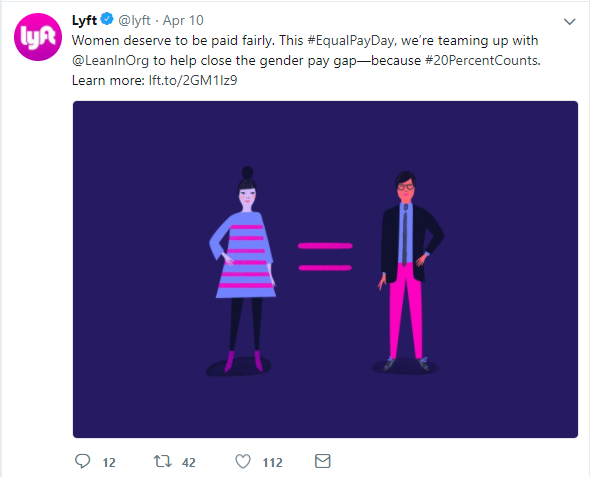
Also, note that Lyft takes action when it takes a stand.
It’s easy to preach, but pair it with action, such as a donation or an event, and you’re proving the legitimacy of your words.
Patagonia Takes On the President
Then there’s the case of Patagonia taking on President Trump.
The company garnered huge acclaim on Twitter with its tweet accompanying a change to its website.
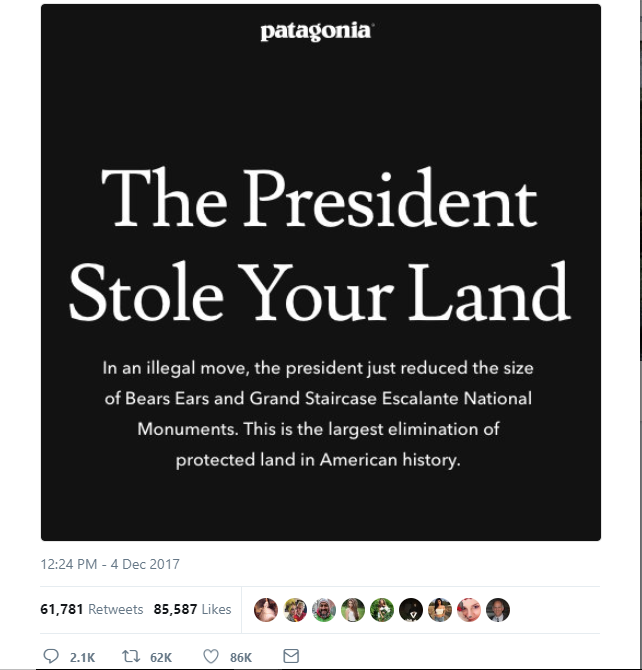
The company blackened its homepage and displayed the message above, then tweeted it.
This is well within Patagonia’s wheelhouse.
Environmental conservatism is at the heart of Patagonia’s brand. It’s in their company’s mission statement to inspire and implement solutions to the environmental crisis.
Patagonia has a history of donating to sustainability causes.
And to accompany the website change, they include information and resources on public lands while also educating people on how to be proactive in fighting back against Trump’s land grab.
Airbnb Advocates Acceptance
Next, there’s Airbnb’s huge #WeAccept campaign.
It’s another multi-channel approach worth noting.
After Trump’s travel ban, Airbnb aired a commercial in support of immigrants during the Super Bowl.
The message was: “We believe no matter who you are, where you’re from, who you love or who you worship, we all belong. The world is more beautiful the more you accept.”
Then, they posted it on Twitter:
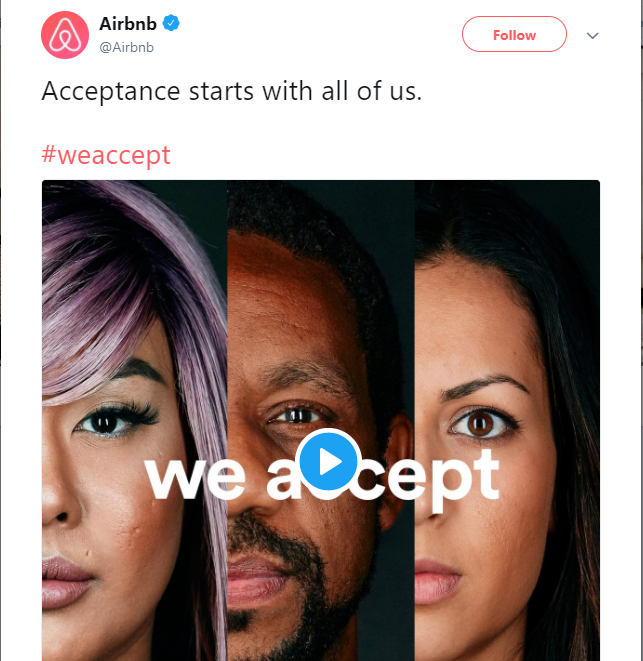
That tweet got more than 82,000 likes and 35,000 retweets.
Along with the ad campaign, Airbnb pledged to provide short-term housing to people in need.
They also pledged to donate four million dollars to the International Rescue Committee in support of refugees.
The Big Takeaways
All of the above examples show companies tackling controversial issues that are well within their niches.
Each company takes action along with their words, and they deliver a succinct message.
Perhaps most importantly, these companies know their audiences.
You won’t find Patagonia standing up in support of the NRA because environmentalists aren’t necessarily hunters or gun owners.
You won’t find Airbnb standing up in support of Facebook. Although plenty of Airbnb customers probably use Facebook, that controversy isn’t in their wheelhouse.
If you’re representing a small to medium-size business, now’s your time to define issues you truly care about.
Signal your support on your website and social channels, then look for times when taking a stand feels right.
You may not have the instant reach of Patagonia, but who’s to say you won’t in the future?
Establish your brand identity early and don’t budge.
Consumers want brands with heart.
Wear yours on your sleeve, and your audience will love you for it.
